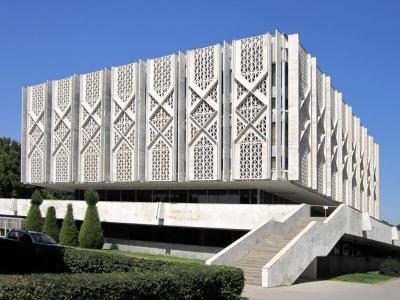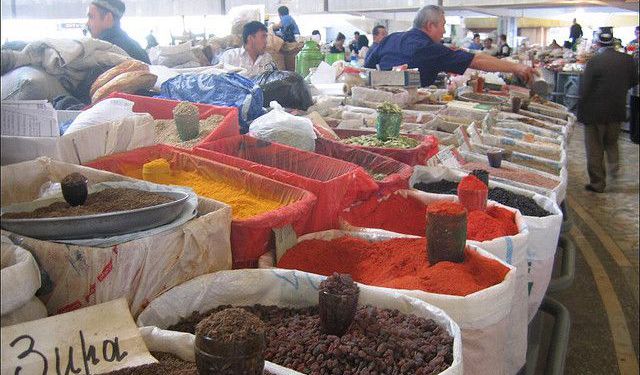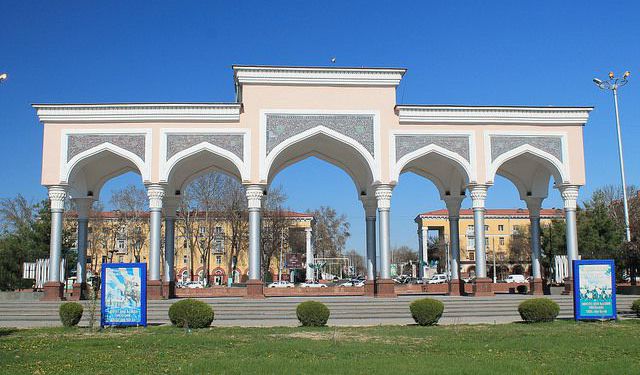State Museum of History, Tashkent
The State Museum of History of Uzbekistan, originally known as the National Museum of Turkestan, was founded in 1876. It is the oldest, and also the largest, museum in Central Asia. It came into being upon the initiative of a group of Russian scientists, members of the Turkestan branch of the Moscow Society of Lovers of Natural History, Anthropology and Ethnography.
During the 20th century, the museum repeatedly changed its location. Currently, it occupies the former quarters of the Lenin Museum, purpose-built in 1970 as the Tashkent branch of the Central Museum of Vladimir Lenin in Moscow to mark the 100th anniversary of the founder of the Soviet state.
Simple, but monumental, almost square in plan, this building looks light and is well visible from all sides. It has four above-ground and two underground floors with an introductory hall and exposition rooms (on the two upper floors). The overhanging upper part of the edifice is lined with openwork Panjar-style panels, which simultaneously serve as enclosing structures and sun protection.
The museum's collection accounts for more than 250,000 exhibits in the field of archaeology, history, and ethnography, dating from the Stone Age to the present day, asserting Uzbekistan as one of the key centers of Eastern civilization. The displayed artifacts, found in the country, are unique and include ancient ceramics and fabrics, a large number of ancient coins and burial relics, as well as some rare archival materials, manuscripts, historical documents and photographs. The Muslim section of the museum features calligraphy pieces and regal edicts dated from the Tamerlane dynasty to the last emirs of Bukhara.
There is also a wealth of ethnic art, household items, and costumes from different parts of Uzbekistan. Among them is a large bronze Saka cauldron, decorated with animal figurines, dated from the 4th-5th centuries BC, and the sculpture of the Buddha from the 1st century AD, found during archaeological dig in the Surkhandarya region.
All of these and more allow visitors a chance to learn about the history of both the Uzbeks and other peoples who used to inhabit, and still do, the territory of Central Asia and particularly that of modern Uzbekistan.
During the 20th century, the museum repeatedly changed its location. Currently, it occupies the former quarters of the Lenin Museum, purpose-built in 1970 as the Tashkent branch of the Central Museum of Vladimir Lenin in Moscow to mark the 100th anniversary of the founder of the Soviet state.
Simple, but monumental, almost square in plan, this building looks light and is well visible from all sides. It has four above-ground and two underground floors with an introductory hall and exposition rooms (on the two upper floors). The overhanging upper part of the edifice is lined with openwork Panjar-style panels, which simultaneously serve as enclosing structures and sun protection.
The museum's collection accounts for more than 250,000 exhibits in the field of archaeology, history, and ethnography, dating from the Stone Age to the present day, asserting Uzbekistan as one of the key centers of Eastern civilization. The displayed artifacts, found in the country, are unique and include ancient ceramics and fabrics, a large number of ancient coins and burial relics, as well as some rare archival materials, manuscripts, historical documents and photographs. The Muslim section of the museum features calligraphy pieces and regal edicts dated from the Tamerlane dynasty to the last emirs of Bukhara.
There is also a wealth of ethnic art, household items, and costumes from different parts of Uzbekistan. Among them is a large bronze Saka cauldron, decorated with animal figurines, dated from the 4th-5th centuries BC, and the sculpture of the Buddha from the 1st century AD, found during archaeological dig in the Surkhandarya region.
All of these and more allow visitors a chance to learn about the history of both the Uzbeks and other peoples who used to inhabit, and still do, the territory of Central Asia and particularly that of modern Uzbekistan.
Want to visit this sight? Check out these Self-Guided Walking Tours in Tashkent. Alternatively, you can download the mobile app "GPSmyCity: Walks in 1K+ Cities" from Apple App Store or Google Play Store. The app turns your mobile device to a personal tour guide and it works offline, so no data plan is needed when traveling abroad.
State Museum of History on Map
Sight Name: State Museum of History
Sight Location: Tashkent, Uzbekistan (See walking tours in Tashkent)
Sight Type: Museum/Gallery
Guide(s) Containing This Sight:
Sight Location: Tashkent, Uzbekistan (See walking tours in Tashkent)
Sight Type: Museum/Gallery
Guide(s) Containing This Sight:
Walking Tours in Tashkent, Uzbekistan
Create Your Own Walk in Tashkent
Creating your own self-guided walk in Tashkent is easy and fun. Choose the city attractions that you want to see and a walk route map will be created just for you. You can even set your hotel as the start point of the walk.
Islamic Architecture Walking Tour
A visit to Uzbekistan is like leafing through the charred chapters of the Silk Road. Nowhere is this ambiance more exemplified than within the Islamic architecture adorning the streets of Tashkent.
One such architectural jewel is the Kukeldash Madrasah, dating back to the late 16th century. There is talk of making it into a museum, but it is currently still being used as a religious school.
... view more
Tour Duration: 2 Hour(s)
Travel Distance: 3.6 Km or 2.2 Miles
One such architectural jewel is the Kukeldash Madrasah, dating back to the late 16th century. There is talk of making it into a museum, but it is currently still being used as a religious school.
... view more
Tour Duration: 2 Hour(s)
Travel Distance: 3.6 Km or 2.2 Miles
Shopping in Tashkent
In the East they say, "A guest on your doorstep is happiness in your home!". Indeed, the Uzbeks, like no other people, are happy to welcome foreigners to their exotic world of aromas, tastes and cordial relationships manifested in authentic local food and products. In Tashkent you can find both of these, and in a great variety, on the street markets (bazaars), in smaller shops and big... view more
Tour Duration: 2 Hour(s)
Travel Distance: 6.0 Km or 3.7 Miles
Tour Duration: 2 Hour(s)
Travel Distance: 6.0 Km or 3.7 Miles
Tashkent Introduction Walking Tour
The capital city of Uzbekistan, Tashkent, also historically known as Chach, is the country's cultural, industrial and administrative hub. First settled some time between the 5th and 3rd centuries BC, throughout its long history the city has had various changes in political and religious affiliations. The name Tashkent comes from the Turkic tash and kent, which literally means "Stone... view more
Tour Duration: 2 Hour(s)
Travel Distance: 4.0 Km or 2.5 Miles
Tour Duration: 2 Hour(s)
Travel Distance: 4.0 Km or 2.5 Miles






